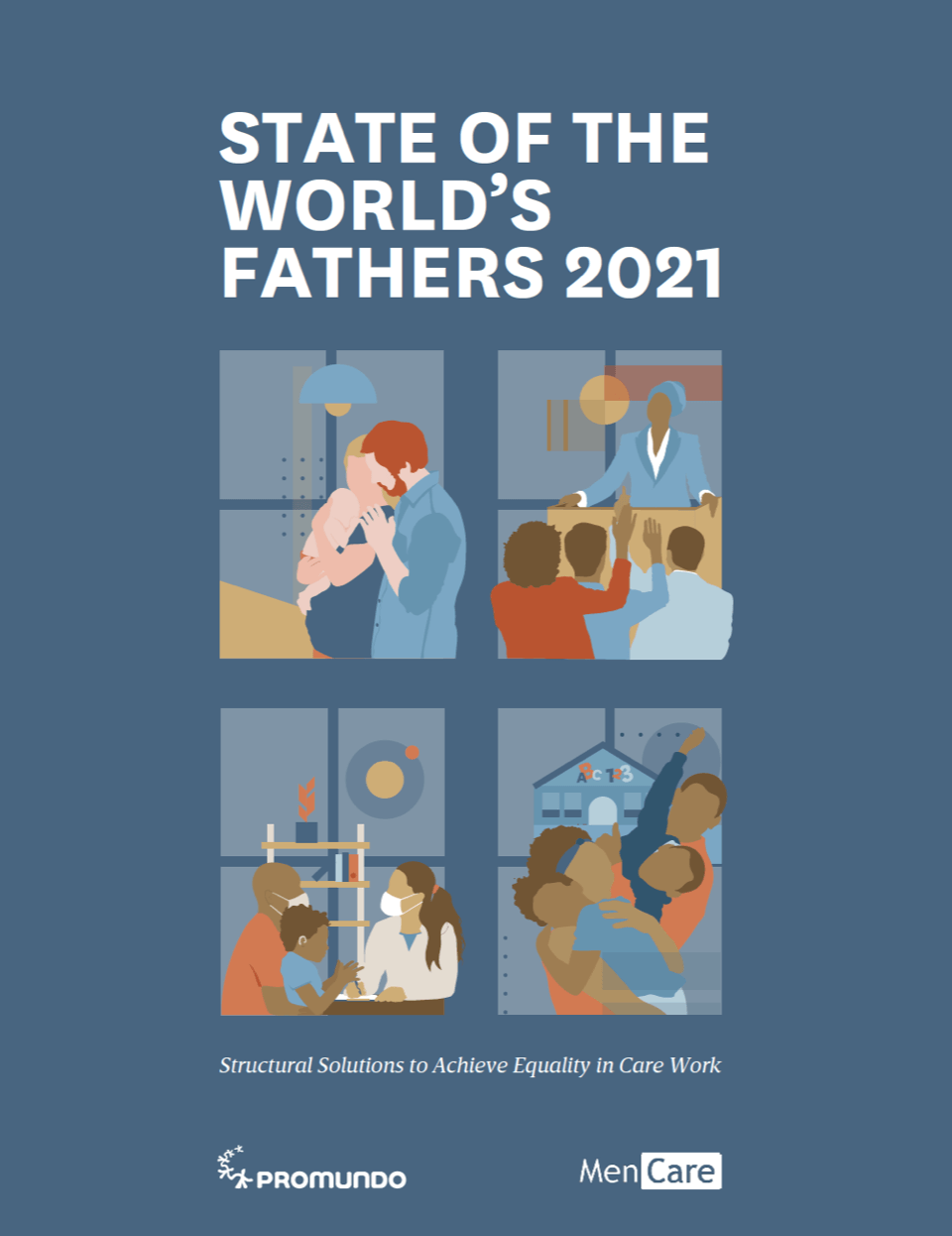Just a few months before the Coronavirus pandemic, the 2019 State of the World’s Fathers report confidently stated men could make a massive difference to gender equality if they increased the amount of unpaid care work each day by 50 minutes. It seemed simple and achievable, but COVID came along and changed everything. The State of the Worlds Fathers 2021 report has just been published and it has shone a light on exactly how much has changed over the past two years.

Prior to the arrival of COVID-19, gender equality seemed to be going in one direction. It was imperfect, moving far too slowly and various issues were being ignored. Nonetheless, men and women were working towards a more equitable future.
I’ve been a big advocate of highlighting the few positives to have come from the pandemic. Increased access to flexible working and men spending more time with their kids being two of them. Nonetheless, when I started reading the latest report, my heart sank. In the opening pages, terms it stated:
“Women have continued to do the lion’s share of care work around the world under the pandemic, and the increase in unpaid care work, combined with a surge in domestic violence, as well as job losses and economic stress, has meant added strain on mental health, particularly among women.”
The 50 minutes of additional unpaid care work men were asked to undertake? Under pandemic conditions, men have indeed upped their game and are doing an additional 3.5 hours of unpaid care work a week.
This represents a healthy increase, but it’s still short of the 6hours 10minutes a week the 2019 called on men to do. Let’s also not overlook the fact that while men are doing an additional 3.5hours of unpaid care work a week, women are on average doing an additional 5.2 hours.
The authors of the report conclude this is a mixed result. On the one hand many dads are doing more on the domestic front. Many men also want to see this become a permanent change. There is, however, no escaping the fact it’s taken a global health pandemic to get the majority of men thinking this way.
The world’s political leaders have hardly done anything to encourage men and fathers to be more family focused. The report’s authors looked at 219 countries and identified 3,100 social policies enacted in response to COVID-19. Of those, 11 addressed unpaid care work including childcare.
How many of these addressed men’s poor participation in unpaid care? Absolutely none of them. You read that correctly. Not a single policy has been enacted anywhere in the world to directly address the lack of male participation in unpaid care work.
I can only really comment on the response by leaders in the United Kingdom. It has left me underwhelmed.
Remember when Rishi Sunak thanked “mums” for all their hard work during the pandemic? That kind of behaviour from the top of Government does nothing to encourage men to focus on their families.
Remember also Jeremy Hunt making that laughable appearance on breakfast television when he called on people to get back to the office to make sure they didn’t miss out on the “fizz and excitement” of working with colleagues? It’s men who are more likely to work outside of the family home so one can only assume his message was for a male audience.
All of this shows one thing: Change will come from the ground up. We simply can’t trust our leaders to enact the changes most of us want, the change society needs for men and women to be treated equally.
The great thing about the State of the Worlds Fathers report is that it is superbly well researched and written. It relies on data from all over the world. The lead authors are feminist writer Nikki van der Gaag and well-known gender equality campaigner Gary Barker. The report has the backing of not for profit organisations such as Promundo, Mencare, Oxfam, Save the Children and Plan International.
It’s an authoritative report that should not be ignored and one that shines a powerful light on gender inequality while offering suggestions on how to improve it. On this occasion, the report lists seven actions that need to be taken to improve gender equality.
One of the most interesting is to promote male caregiving in schools and the media. This way it will become normalised and reinforced. Of all the proposals, this would probably be the easiest to implement.
Almost all the other actions, however, are focused on political change and political leadership: Introducing paid parental leave for both parents as national Government policy, putting national care policies in place to redistribute care more equally between men and women, changing workplace culture to support caregivers and so on.
I’ve always looked forward to reading the State of the World’s Fathers reports. I’ve been following their publication each year since 2015 but this year’s is very different.
The pandemic really has highlighted where inequality exists and the massive steps that need to be taken to address it. Back in 2019 it looked quite rosy and those extra 50 minutes were going to help change the world for the better.
Sadly, the State of the World’s Fathers 2021 shows we must conclude the issues that need addressing require bigger fixes. Most fathers and mothers have come to realise that’s the case, but the politicians of the world haven’t. It’s going to be up to us non-politicians to effect change, so let’s make it happen.
Click here to read The State of the World’s Fathers 2021 in full.







6 thoughts on “State of the World’s Fathers 2021: Is gender equality in reverse gear?”
The problem starts at birth. Men are allowed 2 weeks paternity leave. 2. Weeks. How are we supposed to help and support our new family settle and work out routines etc in 2 weeks!!
I’d go a step further: The problems start before birth when men can’t always attend antenatal appointments etc. And two weeks is nowhere near enough time. That assumes a total uncomplicated natural birth. Very few women have that luxury and it takes them longer to recover during which time dad is needed to run the family home and do everything. It is a daft situation and we must campaign for change.
Thanks for the summary. I am impressed with the correct use of ‘effect’ too. Schools are some of the worst places for demonstrating gender equality. Most teachers are women and the majority of the senior management, male. It would definitely be a good place to start some better role modelling.
Schools do indeed send an odd message about gender equality. In fact I once considered retraining as a primary (elementary) school teacher. I was told I’d be a deputy head of a school in five years purely because I am male. That’s the wrong approach for sure.
Fathers need to want to be proper parents and not just make it a mother’s job. Before becoming a Dad I presumed the old days of Mums doing most of it were in the past. 6 years and two children later, with one on the way, I am regularly appalled at the seeming majority of my fellow fathers who fail to take their job as father seriously. For me it is at the top of my list and I committed to it being 50/50 with my wife. Meanwhile so many fathers have barely ever, or even never, bathed their children or read to them at bedtime. I go to parties with my eldest and other fathers are nowhere to be seen. I take them to play parks and barely see another father all day. You can ask about the government’s role but it has to come from fathers themselves to enact change.
You are absolutely corretc William. I have said this many times: Fathers must want change. The pandemic seems to have changed attitudes so now is the time for men and dads to prove they want change.